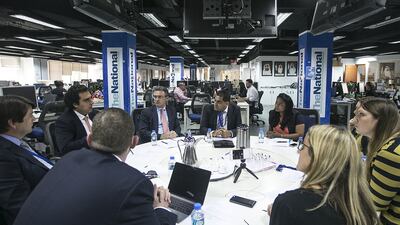UAE residents struggling to meet their financial obligations are now more open to seeking help as a result of The National's Debt Panel column, a round-table discussion revealed yesterday.
During the session, The Debt Panel – One Year On, delegates discussed how the stigma surrounding personal indebtedness has eased since the launch of the advice slot 12 months ago.
The National launched the online column last May after being inundated with letters from chronic debtors seeking a solution. Since then the panellists, a line-up of four financial experts, have advised dozens of borrowers on the best way to solve their financial woes.
“We have brought it to people’s attention that it is OK to ask for help, rather than just have the shame of holding a debt,” said Keren Bobker, one of the four debt panellists and also an independent financial adviser with Holborn Assets in Dubai.
Fellow panellist Philip King, the head of retail banking in the UAE at Abu Dhabi Islamic Bank, said banks quite often realise a customer is in trouble before they do.
“The guy who juggles his cards might miss a payment one time, so he will get a call and that is sometimes not a comfortable process – particularly the first time,” he said. “But please, if you do get in trouble, talk to the bank. Don’t wait for them to call you. And if the bank does call you don’t necessarily see it as something you should be worried about. We can’t fix it if we don’t have a dialogue.”
He said the key to preventing people from borrowing more than they can afford is education. “If we can get the prevention right, then we stop more of these people getting into difficulties later,” said Mr King.
The panellists were joined by Ian Hodges, the senior adviser at Al Etihad Credit Bureau (AECB); Michael Routledge, the founder of savememoney.ae and Gaurav Bhalla, the founder and chief executive of Lotus Loans & Rescheduling Services.
Mr Bhalla revealed that his company, which negotiates with the banks on behalf of those who have too much debt, has dealt with about 1,000 cases since it launched last year.
On average, they have Dh400,000 of debt with an average salary of just Dh14,000 and monthly repayments of Dh23,000. The average debt burden ratio, which is the percentage of someone’s monthly income being used to repay debt, is between 140 per cent and 170 per cent. His clients took out their loans before a law was introduced to help protect people against excessive borrowing by limiting the debt burden ratio to 50 per cent.
“The unfortunate part is that a lot of our customers are not that credit savvy. We ask them simple questions like, ‘How much is your monthly commitment to the bank?’ They fall short of even being able to answer that question,” he told the round-table.
Michael Routledge, who runs the site savememoney.ae, said he is also shocked by the attitude of some of the borrowers he talks to.
“The level of understanding really is horrendous against the level of debt some of these people have.”
But Mr Hodges, from AECB, said most borrowers are not overleveraged, according to credit bureau data.
“I think these are very much the extreme cases you are dealing with,” he said. “The averages from our data are much, much lower. The vast majority of individuals are not overborrowed and do operate within the constraints of the market. But there are always those who have taken too much.”
business@thenational.ae
Follow The National's Business section on Twitter


